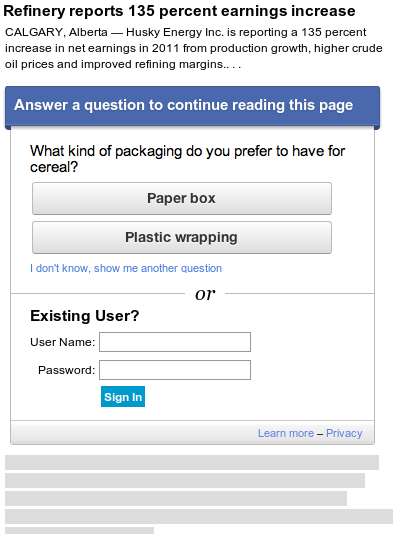Posted by Richard Gingras, Sr. Director, News & Social Products
Credibility and trust are longstanding journalistic values, and ones which we all regard as crucial attributes of a great news site. It’s difficult to be trusted when one is being paid by the subject of an article, or selling or monetizing links within an article. Google News is not a marketing service, and we consider articles that employ these types of promotional tactics to be in violation of our quality guidelines.
Please remember that like Google search, Google News takes action against sites that violate our quality guidelines. Engagement in deceptive or promotional tactics such as those described above may result in the removal of articles, or even the entire publication, from Google News.
If a site mixes news content with affiliate, promotional, advertorial, or marketing materials (for your company or another party), we strongly recommend that you separate non-news content on a different host or directory, block it from being crawled with robots.txt, or create a Google News Sitemap for your news articles only. Otherwise, if we learn of promotional content mixed with news content, we may exclude your entire publication from Google News.
Posted by Scott Zuccarino, Product Manager, Google NewsWhen a story breaks, Google News is designed to give you the most relevant articles from a variety of sources — from national news outlets, to local points of view, to expert opinion pieces. To c…
Posted by Paul McDonald, Product Manager
Whether we’re getting the latest election news, making sense of the day’s stock market activity or looking for an update on our favorite celebrities, we rely on publishers to inform and entertain us. Online publishers often fund the creation of this content through ads; sometimes they ask you to pay for content directly, by buying a subscription or purchasing a particular article.
Now, you may see a new option: the ability to access some of this content by responding to microsurveys, without having to pull out your wallet or sign in. When a site has implemented this option, you’ll see a prompt that offers you a choice between answering a market research question or completing another action specified by the publisher (such as signing up for an account or purchasing access). All responses are completely anonymous — they aren’t tied to your identity or later used to target ads. The prompts look like this:

Publishers get paid for hosting surveys. A number of publishers, such as the The Texas Tribune, the Star Tribune and Adweek have already started running these microsurveys on their sites.
So what’s the point of these questions? From international brands to local food trucks, every business owner wants to make important decisions with their customers’ feedback in mind. That’s why we’ve created Google Consumer Surveys, a new business-facing product that makes custom market research easy. It enables companies to ask questions (the ones you’ll later see on your screen) and get back quantitative results quickly, accurately and cost-effectively. Companies have already been using it to research everything from online shopping behavior (Lucky Brand Jeans) to gluten-free baking mixes (King Arthur Flour), and to assess brand awareness (Timbuk2) and inform product development (479 Popcorn). Google shares the money these companies spend with our publisher partners.
The idea behind Google Consumer Surveys is to create a model that benefits everyone. You get to keep enjoying your favorite online content, publishers have an additional option for making money from that content, and businesses have a new way of finding out what their customers want.
If you’re a publisher interested in running microsurveys on your site, let us know.
Posted by Yaroslav Kurovtsev, Software Engineer, Google Translate
To help bridge language barriers between you and the news of interest to you from around the world — and to bring you more diverse perspectives on foreign events — we’ve added a new “translate” button to the expandable story boxes in the U.S. English edition of Google News. Clicking the translate button reveals the English translation of the original headline using Google Translate. Clicking on the headline takes you to the publisher’s website where you can choose to use Google Translate to see an English version of the entire article. Headlines are labeled with their country of origin. To do this, we look for foreign articles from local sources on a relevant news topic.
For example, in the case of the flood in Thailand, in addition to surfacing English articles from international press like New York Times, we might show a related article from a local source like อาร์วายที9.
At the same time, we hope readers will benefit from finding relevant news in other languages and being able to read it without knowing the language.
Posted by David Smydra, Google News Product Specialist
(Cross-posted on the Webmaster Central Blog)
Google News recently updated our infrastructure to crawl with Google’s primary user-agent, Googlebot. What does this mean? Very little to most publishers. Any news organizations that wish to opt out of Google News can continue to do so: Google News will still respect the robots.txt entry for Googlebot-News, our former user-agent, if it is more restrictive than the robots.txt entry for Googlebot.
Our Help Center provides detailed guidance on using the robots exclusion protocol for Google News, and publishers can contact the Google News Support Team if they have any questions, but we wanted to first clarify the following:
- Although you’ll now only see the Googlebot user-agent in your site’s logs, no need to worry: the appearance of Googlebot instead of Googlebot-News is independent of our inclusion policies. (You can always check whether your site is included in Google News by searching with the “site:” operator. For instance, enter “site:yournewssite.com” in the search field for Google News, and if you see results then we are currently indexing your news site.)
- Your analytics tool will still be able to differentiate user traffic coming to your website from Google Search and traffic coming from Google News, so you should see no changes there. The main difference is that you will no longer see occasional automated visits to your site from the Googlebot-news crawler.
- If you’re currently respecting webmaster guidelines for Googlebot, you will not need to make any code changes to your site. Sites that have implemented subscriptions using a metered model or who have implemented First Click Free will not experience any changes. For sites which require registration, payment or login prior to reading any full article, Google News will only be able to crawl and index the title and snippet that you show all users who visit your page. Our Webmaster Guidelines provide additional information about “cloaking” (i.e., showing a bot a different version than what users experience). Learn more about Google News and subscription publishers in this Help Center article.
- Rest assured, your Sitemap will still be crawled. This change does not affect how we crawl News Sitemaps. If you are a News publisher who hasn’t yet set up a News Sitemap and are interested in getting started, please follow this link.
- For any publishers that wish to opt out of Google News and stay in Google Search, you can simply disallow Googlebot-news and allow Googlebot. For more information on how to do this, consult our Help Center.
As with any website, from time to time we need to make updates to our infrastructure. At the same time, we want to continue to provide as much control as possible to news web sites. We hope we have answered any questions you might have about this update. If you have additional questions, please check out our Help Center.
Posted by Arun Prasath, Tech Lead, Mobile Google News
Alongside working on improving the Google News design for smartphones, we have also been looking into enhancing our offering for tablet devices. Today, we are launching a few minor enhancements to …
Posted by Jasson Schrock, User Experience Designer
Beginning today in the U.S. English edition of News, you may notice a few changes in the look and feel. This is part of a Google-wide initiative to improve your experience, and today we’re happy to extend this to Google News.
For starters, we’ve cleaned up the Google News homepage a bit. With fewer visual distractions and less clutter on the page, it should be faster to find the news important to you. The editions menu and “Personalize” button at the top should be easier to see. The “Personalize” button links to your recently consolidated personalization settings including your preferences for topics and favorite sources. Throughout the site, all the features and functionality are still there, but this updated design is aligned with the new consistent look across other recently updated Google sites like Gmail, Maps and Search.
Before

After

In the coming months, you’ll continue to see more improvements to the layout and design of the site, and we’ll also expand internationally.
Posted by Natasha Mohanty, Engineer, Google News(Cross-posted on the Official Google Blog)On Google News, the average reader of political news has read 20 articles about politics in the last six months. Where do you stand?Starting today, in the U.S. ed…
(Cross-posted on the Official Google Blog and the Google Public Policy Blog)Over the past few months, we’ve announced $5 million in grants to be distributed by the John S. and James L. Knight Foundation and the International Press Inst…
Posted by Sean Carlson, Global Communications & Public AffairsOutside 555 Pennsylvania Avenue in Washington, D.C., the front pages of newspapers from all 50 U.S. states mark the entrance to the Newseum. Inside the lobby, a gallery of Pulitzer Prize…
Posted by Chase Hensel, Associate Product Manager, Google NewsEvery day, Google News crawls through thousands of news articles to present you with the most relevant and recent stories. For a long time, we’ve realized that bringing relevant news to th…
Introducing “News near you” on Google News for mobile
Posted by Navneet Singh, Product Manager – Google News Google News for mobile lets you keep up with the latest news, wherever you are. Today we’re excited to announce a new feature in the U.S. English edition called “News near you” that…
Posted by Krishna Bharat, Founder and Head – Google NewsGoogle News was born in the aftermath of the tragic events of September 11, 2001. An unprecedented act of terrorism on U.S. soil, by a foreign militant group led by Osama Bin Laden, changed the c…
Posted by Lucian Cionca, Software EngineerLast summer we redesigned Google News with new personalization features that let you tell us which subjects and sources you’d like to see more or less often. Starting today — if you’re logged in — you may…
Posted by Dan Hirsch, Google News Support TeamYesterday, the Pulitzer Prize Board announced an impressive list of 13 prize winners and 29 finalists for excellent work in journalism and storytelling. These winners represent a wide array of incredible st…



